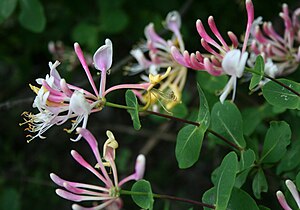Lonicera etrusca: Difference between revisions
διὸ καὶ μεταλάττουσι τὴν φυσικὴν χρῆσιν εἰς τὴν παρὰ φύσιν αἱ δοκοῦσαι παρθένοι τῶν εἰδώλων → therefore those professing to be virgins of the idols even change the natural use into the unnatural (Origen, commentary on Romans 1:26)
m (Text replacement - "(?s)(==Wikipedia EN==)(\n)(.*)(\n[{=])" to "{{wkpen |wketx=$3 }}$4") |
mNo edit summary |
||
| Line 1: | Line 1: | ||
{{lael | {{lael | ||
|lgtx=[[αἰγίνη]], [[περικλύμενον]], [[περικλύμενος]] | |lgtx=[[αἰγίνη]], [[περικλύμενον]], [[περικλύμενος]], [[κλύμενον]] | ||
}} | }} | ||
{{wkpen | {{wkpen | ||
Latest revision as of 11:35, 24 May 2023
Latin > Greek
αἰγίνη, περικλύμενον, περικλύμενος, κλύμενον
Wikipedia EN
Lonicera etrusca is a species of honeysuckle known by the common name Etruscan honeysuckle. It is native to Southern Europe, Western Asia and North Africa and it is known elsewhere, including the Pacific Northwest of North America, as an introduced species where it has escaped cultivation. It is kept in gardens as an ornamental plant.
Translations
ar: عسلة توسكانية; bg: етруски нокът; ca: lligabosc etrusc; co: caprifogliu; fa: لنیکرا اتروسکا; fi: etruskikuusama; fr: chèvrefeuille d'étrurie; he: יערה איטלקית; hr: etruščanska kozja krv; ru: жимолость этрусская

